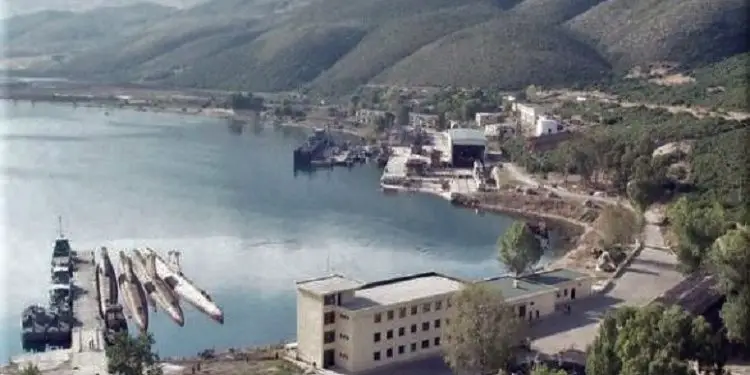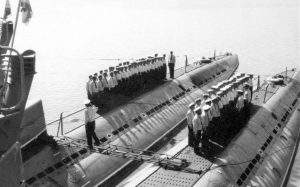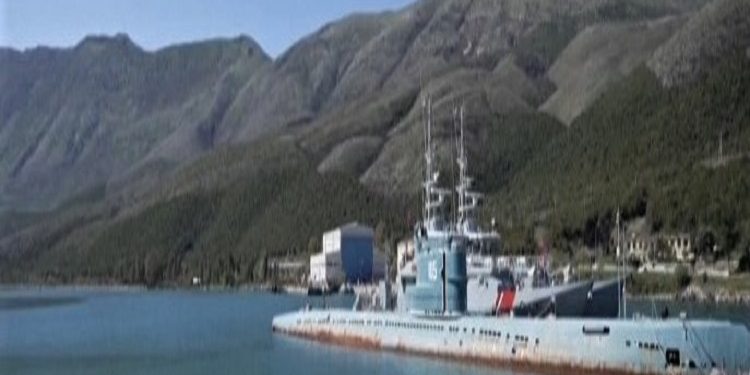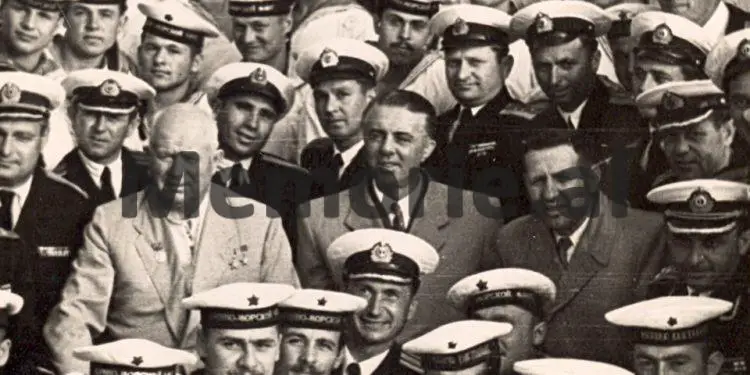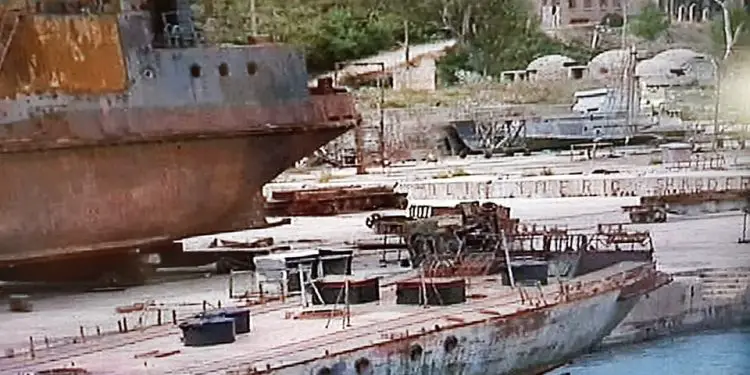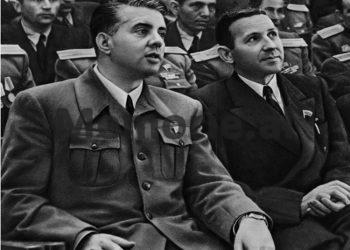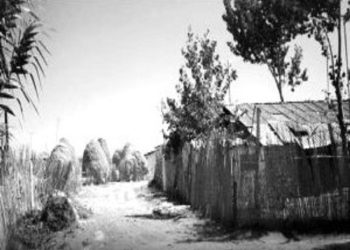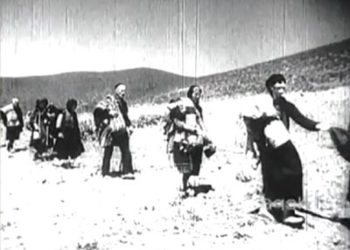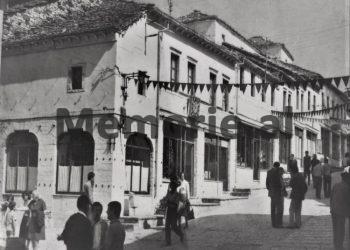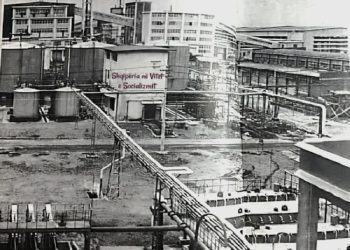Memorie.al It are a city of 12,000 inhabitants, but 65 years ago, it was simply a small village. The first Cham inhabitants who arrived after World War II found a swamp where it was impossible to live. It was the military base, built a few years later, that transformed it into a residential center, giving it the ancient toponym of Orik. Today, the residents who have come from all over Albania are fortunate to enjoy the beach and the city’s transformation into a true vacation center… over the former swamp! The four initial Cham families who arrived in this place after World War II would never have imagined, even in their wildest dreams that the marshy land where they arrived to build their lives would turn into a residential center.
Today, the only evidence of their arrival remains the red-roofed houses that are at the entrance, lost under the dominance of the many-storied buildings that have risen everywhere over Orikum. In fact, for the residents who came later, this holds little significance. Many of them have never even heard of them. Now merged with a city resembling a municipal town, they simply comprise history. As for others, the city’s history has been told more generously. The Russians came, then Albanians from all over the country.
The first structures were built, the first children were born, and years later, the earliest residents began to pass away. Thus, their city breathed life. The waters of the swamp, rising and falling, interacted with the sea and the paths traversed by shepherds through the dense forest, gradually gave way to the asphalt of a city that few could have imagined.
Ferik Harka, a retired man, brings imagination back to reality. We recall the memories from a few months ago, when, thanks to this chaos, the residents of Orikum, specifically the few supplemented with local Dukat residents, confronted the police with stones over a large plot of land at the city entrance. Taken, retaken, sold, entangled in the jungle of supposed Albanian bureaucracies, whether property of the Farm or not, ownership claims came from several parties. Today, things have faded, while the remaining barren plot is evidence of the property entanglements not only of the Orikums but of Albanians…!
“No one has ever owned it, because when we arrived, there was nothing here. There was a large swamp and a forest around, where no one could live. But today, it’s different…” – this is told to me by another man, with whom we spend late afternoons in the city, as the sunset signals from Sazani. He talks a lot, but when Ferik is around, he falls silent. The latter, the former commander of the divers at the Base, has grasped the excessive boasts but more empty words. Often, he glances towards where the Pasha-Liman Base once was and remains, but with hesitation.
“No one is left,” – he clarifies. – “We’ve grown old.” He then laughs lightly. On the promenade leading to the beach, but more around the city, we stroll in the evening and have time to talk about everything. He is accompanied by his nephew, who seeks out half-remembered places that he has just touched upon in his childhood memory, while he shares events and experiences he has had. I learn how the first families arrived that made the history of the beginning of this town, which once didn’t even appear on the map.
Until then, in the only area where passage was possible, the residents of Dukat grazed their livestock, while the swamp did its sleeping for ages, which the human mind cannot comprehend. Ferik geometrically explains the city to me, as he himself seems to have a geometric thought. Everything is defined in a way that makes it seem somewhat fatalistic. Orikumi, when he had come from a small village in Përmet, was established as a municipality center in 1960. “The Farm Neighborhood,” where the first residents were sheltered, was formed in 1949, and the administrative center was located in Dukat, as chronicles of the time say. That is why now, quite ironically but often with a hidden jealousy, the residents of Dukat say they are on their own land…!
Present Day
In fact, the lands today are truly inhabited by the residents of Orikum, who, after leaving their work at the Base, engage in various jobs. And, from people who knew how to survive the swamp, they now enjoy the vast beach that stretches from near the Base and continues right to the city, where a whole set of buildings has completely transformed Orikum, making it one of the largest attractions after the coastline of Vlorë. Dozens of small shops surround the city, dominated by small marketplaces, cafés, and internet cafes.
In these environments, the children of the current generation of Orikum, who have come from emigration, keep the cyber imagination alive and convey the trends of their age, which has made the small town feel old again. With the end of the Cold War era, when the base was destroyed and the residents remained in the old two-story buildings, which were originally built for the Russian military and their Albanian colleagues, the face of the city changed. The need taught the residents to turn to emigration, while the remaining portion fixed their houses and thought about home tourism.
Thanks to the peaceful work of the mayors, the road to the Base was constructed, which had never been built during the Cold War years, and today it connects the area from the end of the New Ring of the city until it reaches the entrance of the Pasha-Liman Military Base on the southern side of the Orikum-Pasha-Liman National Road. The drainage systems were improved, and the main boulevard in the city was organized. Today it overflows with young people and thousands of vacationers from the country and abroad. “There are few compared to a year ago,” Ferik tells me, in a way testing both the present and the future of the city. – “They don’t have money like before. It’s clear,” he summarizes his philosophy briefly.
Once Again for the Ancestors
The philosophy of the creation of Orikum is also linked to the arrival of a high-level delegation in 1956, as remembered by the former commander of the divers, when the studies for the Base were being conducted; Russian specialists showed Marshal Zhukov where the main base for the Warsaw Pact forces could be located in the Mediterranean. It was easy to say, but for the engineering soldiers who would implement it, it was Hell itself. Ferik Harka recalls that the area was a swamp and the entire place was a forest. Mixed with reeds and brambles, it made it impassable for people. The swamp itself had wells and areas where the water was one to two meters deep.
“It was unexploited as it made its own conditions, combining with the sea and being nourished also with its wells. Until that time, there was nothing of significance, except for a police post and nothing else. For the first time, 18-24 apartments were built, where the Russians and Albanians would be housed, totaling 72 families.” – he explains to us. Gradually, things progressed, while the Palace of Culture, a typical structure in Slav style, was inaugurated on August 15, 1960.
“This settlement had naval forces and ground forces: engineers, support staff, to complete the entire Base with necessary equipment. The first ships that arrived were auxiliary vessels: Hydrography, dredgers to deepen the port, tugs, and the police ship to survey the bottom. Every year, work was done to build the piers, as installations and acoustics were done in the pontoon. At that time, there were no concrete piers. The largest ship that arrived was the steamer ‘Çapur,’ which supplied the military. Then came the ‘Katelnikovi,’ a light cruiser, and later the ship ‘Dajti,’ which was a warship that was converted into a cargo ship…”! He stops here.
Intermezzo – Orikum
This city has a unique fate, which few have, apart from the main Albanian cities. Today’s Orikum is just a few hundred meters from the ancient city of Orik, which stretches along the southwestern shore of the bay of the same name and is based at the foot of the Karaburun peninsula. The center, which is now within the Base, is located on a low limestone cliff at the end of a wooden pier, which separates a small lagoon from the bay (Pasha-Liman).
The ancient author Apollonius of Rhodes links the establishment of the city with the Euboeans and their return to Troy. Livy writes that the city played an important role in the battle of the Romans against Philip V of Macedonia, as well as in Caesar’s battles against Pompey, documented in Caesar’s civil wars. In the last century, several archaeologists visited the city, while the Vlora family had an extraordinary collection of finds.
Patsch, Ugolini have left us interesting descriptions, while Hammond documents and describes a path used by local shepherds that led to the church of Marmiroit, very close to Orikum, as well as the presence of several archaeological objects along the lagoon’s shore. In modern times, excavations carried out by local and foreign expeditions have found amphorae that prove the existence of the city dating back to the 5th-6th century BC. The city is believed to have also served as the main port with an inner harbor, where stones were transported from Karaburun to Apollonia, and a little further to Triport.
How did the people come… like him…?!
Bashkimi, a driver at the Base, whose photo at home in his characteristic uniform shows him proudly, and who is a peer of Ferik, will hastily tell me many things. Of course, nostalgia takes a primary place. But I find the diver in the evening bent over the chess games, providing me with more companionship. Thanks to his work at the Base, he raised a family with his wife, who gave life to five children.
For 30 years he served on the police ship, “but during that period,” he asserts, “we didn’t know much and had a sort of regret, because we didn’t understand how politics was. I hadn’t been a communist because I didn’t like the organization and the work of the party that was done. The work was very inadequate. I had to work with a high conscience, but the workers were despised: Whereas the sycophants were in the front line…” – “Just like now,” – I tell him. He nods. It is close-minded to ask a person from the Base about its history and the Russians.
He slowly recounts how they were instructed to maintain composure and how to protect themselves from provocations that could disrupt the equipment. “There were also special people among the Russians and not all were trained to destroy. Nevertheless, we did not fall into their swamp despite provocation…! He talks about Xhemal Shami, one of the most capable commanders, who graduated in Leningrad, because he was very well trained and knew how to make decisions and draw correct conclusions regarding the situation at hand, etc.
How did things unfold after the ’60s?!
But things didn’t stop there. Our actions seemed to grow, and in the space that once was difficult to navigate, today there are entire promenades. “Later, the construction and clearing of the Bay of Vlorë began for debris, out of fear of mines. We thought we had become enemies and there were suspicions that there would be checks for navigation. Tasks arose one after another, and the divers were engaged not only in military work but also had terrain to cover.
They built underwater steps for recovering sunken ships because they obstructed the arrival of vessels in the area, and moreover, for the hydrographic works from the 1960s to the 70s, we were extensively engaged.” China didn’t leave much of a void from the Russians, because in the city, in their place, Chinese specialists appeared. They brought the first auxiliary ships and began to assist with everything they could. The city had now become home to 2000 residents, and most of them worked at the large Base. He and his friends continued to tackle task after task.
Wearing large suits with ballast and clothes weighing nearly 84 kg, they managed to dive down to 60 meters. The episodes of the man were among the most unimaginable, seemingly dwarfing Hollywood films. In one recovery operation, they had to unsuccessfully raise two excavators sunk dozens of meters under water, one of which had a hose wrapped around his arm, marking the hardest moment of his life; in another, he had to retrieve two unlucky Albanian pilots who had crashed in winter in a “Jet”-18. In another instance, the Commander recalls an extraordinary civil task, where he needed to prepare at 53 meters to extract 300 cubic meters of material that held three turbines trapped in the Vaun e Dejës.
“We suffered a lot,” – he tells me one evening after a long discussion. “I heard someone say: We have not seen people like this. Only later did people see and understand our difficulties. But never did a person think that they should be valued,” he concludes the conversation with sadness. “Most people were not only unprofessional but were simply undervalued as individuals to be valued by the Party…” he adds with pain. “The Party did it, they would say. I, together with my friends, worked at 70-80 meters, while they would say the Party did the work. That communist had no idea at all and didn’t know anything…”! He reminds me of an episode when these pseudo-heroes, in the first firing with a torpedo in 1974, could only hit one target out of four they shot at…!
The Beach
But these have remained in an unwritten history, while the man enjoys his retirement vacations today. The current residents of Orikum have understood the benefits of the beach and strive to serve as best as they can. Of course, they overdo it with prices, as they are several times higher than in Tirana, but even here they justify themselves. In Dukat, no one thinks of producing and selling agricultural goods; instead, everyone engages in geopolitical conversations. The residents themselves are engaged in an unseen hunt for guests, through which they make their own lobbying to come to visit. If only there were a site that could discipline everything, it is not spoken of here. Just like in the rest of Albania, things remain spontaneous, and perhaps this is still called beauty. Or coincidence.
Furthermore, the last van from the city to Vlorë is around 6:00 PM, when the city closes in its shell of gossip and trivialities. Nevertheless, tomorrow is beautiful and the beach of Orikum, with all its qualities, is wonderful. For this, even the elderly man assures me proudly, there is no doubt about it. Now in the race are property owners who are building everywhere, with temporary permits and who have seized the beach ahead of time, even removing the pilings that hindered the advancement of the sea. The thirst for profit does not stop before anything. Meanwhile, the Base has turned into a relic, just like the old city that gave its name to the new Orikum, which shelters the villages: Dukat Fshat, Dukat i Ri, Tragjas, and Radhimë.
There are not many days left, and the day will come when we have to part with this pleasant man, who has devoted more time to the sea than to the land. A light breeze blowing from the swamp interrupts our conversations, while vacationers invade the beach promenade once again in the evening, which was built over the former swamp. We do not speak. We gaze at the sea, which performs its characteristic autocratic monologue. A hot summer day…!/Memorie.al




